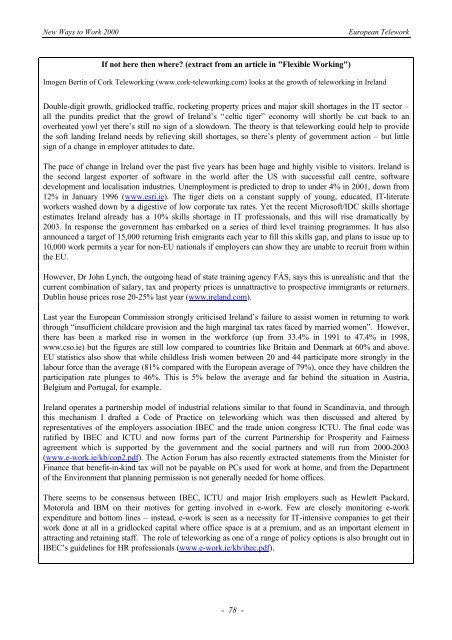eWORK 2000 - European Telework Week
eWORK 2000 - European Telework Week
eWORK 2000 - European Telework Week
- No tags were found...
You also want an ePaper? Increase the reach of your titles
YUMPU automatically turns print PDFs into web optimized ePapers that Google loves.
New Ways to Work <strong>2000</strong><strong>European</strong> <strong>Telework</strong>If not here then where? (extract from an article in "Flexible Working")Imogen Bertin of Cork <strong>Telework</strong>ing (www.cork-teleworking.com) looks at the growth of teleworking in IrelandDouble-digit growth, gridlocked traffic, rocketing property prices and major skill shortages in the IT sector –all the pundits predict that the growl of Ireland’s “celtic tiger” economy will shortly be cut back to anoverheated yowl yet there’s still no sign of a slowdown. The theory is that teleworking could help to providethe soft landing Ireland needs by relieving skill shortages, so there’s plenty of government action – but littlesign of a change in employer attitudes to date.The pace of change in Ireland over the past five years has been huge and highly visible to visitors. Ireland isthe second largest exporter of software in the world after the US with successful call centre, softwaredevelopment and localisation industries. Unemployment is predicted to drop to under 4% in 2001, down from12% in January 1996 (www.esri.ie). The tiger diets on a constant supply of young, educated, IT-literateworkers washed down by a digestive of low corporate tax rates. Yet the recent Microsoft/IDC skills shortageestimates Ireland already has a 10% skills shortage in IT professionals, and this will rise dramatically by2003. In response the government has embarked on a series of third level training programmes. It has alsoannounced a target of 15,000 returning Irish emigrants each year to fill this skills gap, and plans to issue up to10,000 work permits a year for non-EU nationals if employers can show they are unable to recruit from withinthe EU.However, Dr John Lynch, the outgoing head of state training agency FÁS, says this is unrealistic and that thecurrent combination of salary, tax and property prices is unnattractive to prospective immigrants or returners.Dublin house prices rose 20-25% last year (www.ireland.com).Last year the <strong>European</strong> Commission strongly criticised Ireland’s failure to assist women in returning to workthrough “insufficient childcare provision and the high marginal tax rates faced by married women”. However,there has been a marked rise in women in the workforce (up from 33.4% in 1991 to 47.4% in 1998,www.cso.ie) but the figures are still low compared to countries like Britain and Denmark at 60% and above.EU statistics also show that while childless Irish women between 20 and 44 participate more strongly in thelabour force than the average (81% compared with the <strong>European</strong> average of 79%), once they have children theparticipation rate plunges to 46%. This is 5% below the average and far behind the situation in Austria,Belgium and Portugal, for example.Ireland operates a partnership model of industrial relations similar to that found in Scandinavia, and throughthis mechanism I drafted a Code of Practice on teleworking which was then discussed and altered byrepresentatives of the employers association IBEC and the trade union congress ICTU. The final code wasratified by IBEC and ICTU and now forms part of the current Partnership for Prosperity and Fairnessagreement which is supported by the government and the social partners and will run from <strong>2000</strong>-2003(www.e-work.ie/kb/cop2.pdf). The Action Forum has also recently extracted statements from the Minister forFinance that benefit-in-kind tax will not be payable on PCs used for work at home, and from the Departmentof the Environment that planning permission is not generally needed for home offices.There seems to be consensus between IBEC, ICTU and major Irish employers such as Hewlett Packard,Motorola and IBM on their motives for getting involved in e-work. Few are closely monitoring e-workexpenditure and bottom lines – instead, e-work is seen as a necessity for IT-intensive companies to get theirwork done at all in a gridlocked capital where office space is at a premium, and as an important element inattracting and retaining staff. The role of teleworking as one of a range of policy options is also brought out inIBEC’s guidelines for HR professionals (www.e-work.ie/kb/ibec.pdf).- 78 -








